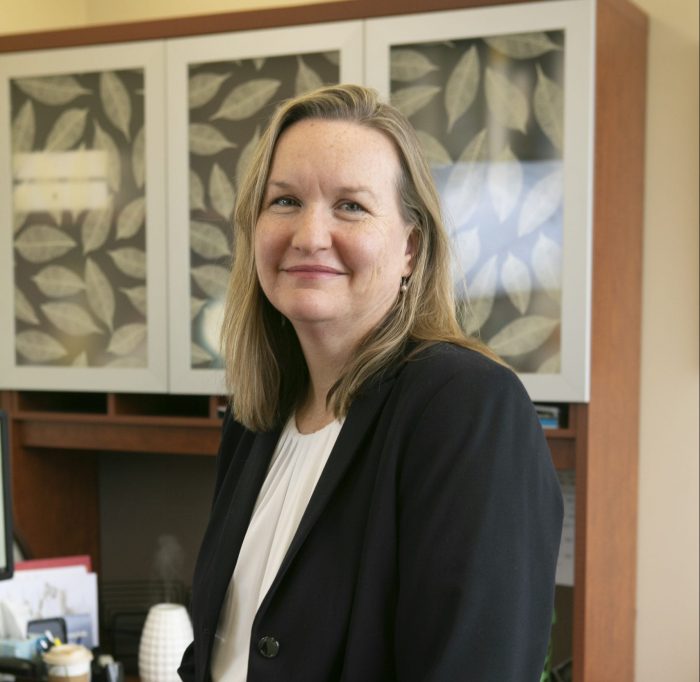SB Launches HealthierU, Provides Mental Health Support

Stony Brook University has taken numerous steps to protect the mental and physical health of the many health care and hospital workers who are helping the growing number of people suffering through the coronavirus pandemic.
Indeed, this past Monday, the university launched HealthierU, an employee wellness program, which streams 30-minute sessions Monday through Friday at 3 p.m.
“A lot of us are thinking about staff on the hospital side who are really being tested in an unprecedented way,” said Cathrine Duffy, the director of HealthierU. “I feel especially humbled and moved to be able to help in any small way given their vast efforts.”
The sessions will cover themes such as feeling connected during social distancing, self-care, our common humanity, worries, anxieties and fears and finding meaning in difficult times.
The sessions are interactive, encouraging viewers to comment, ask questions and give feedback for use in later programs. The focus of the sessions will include guided imagery meditation, drawing and writing, stress reduction and nutrition. The programming will run through at least April 10 and possibly longer. After the live session, the videos will be available on Stony Brook’s HealthierU web site.
The first session had almost 300 views and Stony Brook just posted its second session on the web site. Both are available on Facebook and will be posted to hospital channels.
HealthierU is looking at more long-term topics such as financial wellness and even the possibility of bereavement support.
The audience for this can include members of the community, as the sessions will not be password protected. Those participating in the program can provide commentary, which Duffy will moderate while mental health expert Joshua Hendrickson, who is an integrative mental health and an alumnus of Stony Brook, will facilitate the program.
At this point, Duffy has not reached out to experts to see if they are available or interested in leading future classes, although Stony Brook staff and community members have contacted her about the programming.
Indeed, on Monday, the staff at the Mindful Turtle yoga studio, which was founded and is owned by Danielle Goldstein, offered free streaming zoom yoga to Stony Brook employees for 20 classes each week.
“We are able to offer the classes for free because of the support we have received from the community,” Goldstein wrote in an email. “Students are continuing to pay their memberships which allows me to continue to pay the yoga teachers for the online classes.”
The notion of helping the Stony Brook community originated through group discussions among teachers. The group which includes Stacy Plaske who had run Balance Yoga, which Goldstein now runs, wanted to help healthcare workers. A nursing school student, Plaske reached out to her Stony Brook contacts.
Stony Brook employees can also access a virtual employee assistance program through the web site StonyBrook.Edu/EAP.
Health care workers throughout the country can also access Headspace, a mindfulness and guided meditation app, and 10percenthappier, a meditation app, for free.
Stony Brook started a virtual support group yesterday through Microsoft Teams at 8 a.m., noon, and 8 p.m. every Monday through Friday. These groups are open to anyone at Stony Brook who is part of the health care team.
Stony Brook started a virtual support group specifically for residents, according to Adam Gonzalez, the Director of Behavioral Health at Stony Brook Medicine.
Stony Brook is working on creating an email where employees can write to request individual virtual sessions as well. To request a virtual one on one session, faculty can contact the faculty/ staff care team by phone and/or email.
Another initiative Stony Brook developed is called Not All Superheroes Wear Capes. The community has sent pictures, handmade cards, and video messages that the university shares with its hospital staff. People have sent in pictures as well as children singing “God Bless America” or holding up thank you signs, which are “a great motivator for the doctors and nurses on the front lines,” as well as a show of appreciation and support, said Gonzalez, who has worked on the mental health of first responders to the World Trade Center disaster and responders to Hurricane Sandy. He is also working with NASA on ways to provide mental health care to astronauts during long duration space missions.
People can send these supportive cards and messages to [email protected].
The whole organization is encouraged to download Microsoft teams on their phones and laptops and home computers, according to Gonzalez. Employees can click on the app and click into the wellness channel to see these messages. They can view messages and support resources on the Wellness Champions channel, which is for Stony Brook Medicine employees. They can also access the virtual support groups through the app.
Duffy, who is a 10 percent Employee Assistance Program counselor and is on a group with the Wellness Champions channel, which Gonzalez runs, said the channel is for Stony Brook Medicine employees, who are mainly hospital staff. Stony Brook is sharing links widely through internal channels such as the hospital Pulse page.
Gonzalez suggested the traumatic situation of the pandemic and the quarantine response creates a normal stress reaction. That includes being anxious and hyper vigilant and worried, struggling to sleep, and feeling run down and scared.
Practicing mindfulness, which means being in the present moment, can help people stay grounded, Gonzalez said. Mindfulness can include practicing meditation exercises, paying attention to your breathe, listening to music, connecting to family and friends, or focusing on a pleasant activity like watching a movie.
“Having hope that this isn’t going to last forever” also helps, Gonzalez added.
The Wellness Champions channel has different resources for supporting mental health, including recommendations from the CDC and the World Health Organization, access to free meditation apps, and virtual substance abuse recovery resources like Alcoholics Anonymous and other programs.
Gonzalez works through his own stress by connecting with family through a group text message, using Facetime with his niece and nephew, and calling friends and colleagues.
Duffy expressed her goal to see these efforts contribute to life for those dealing with significant challenges and changes.
“I truly hope this work provides some peace and comfort to everyone working on the frontlines, from health care providers to faculty transitioning courses to online, to staff transitioning their services online, to our IT department keeping us all connected,” Duffy said in an email.






